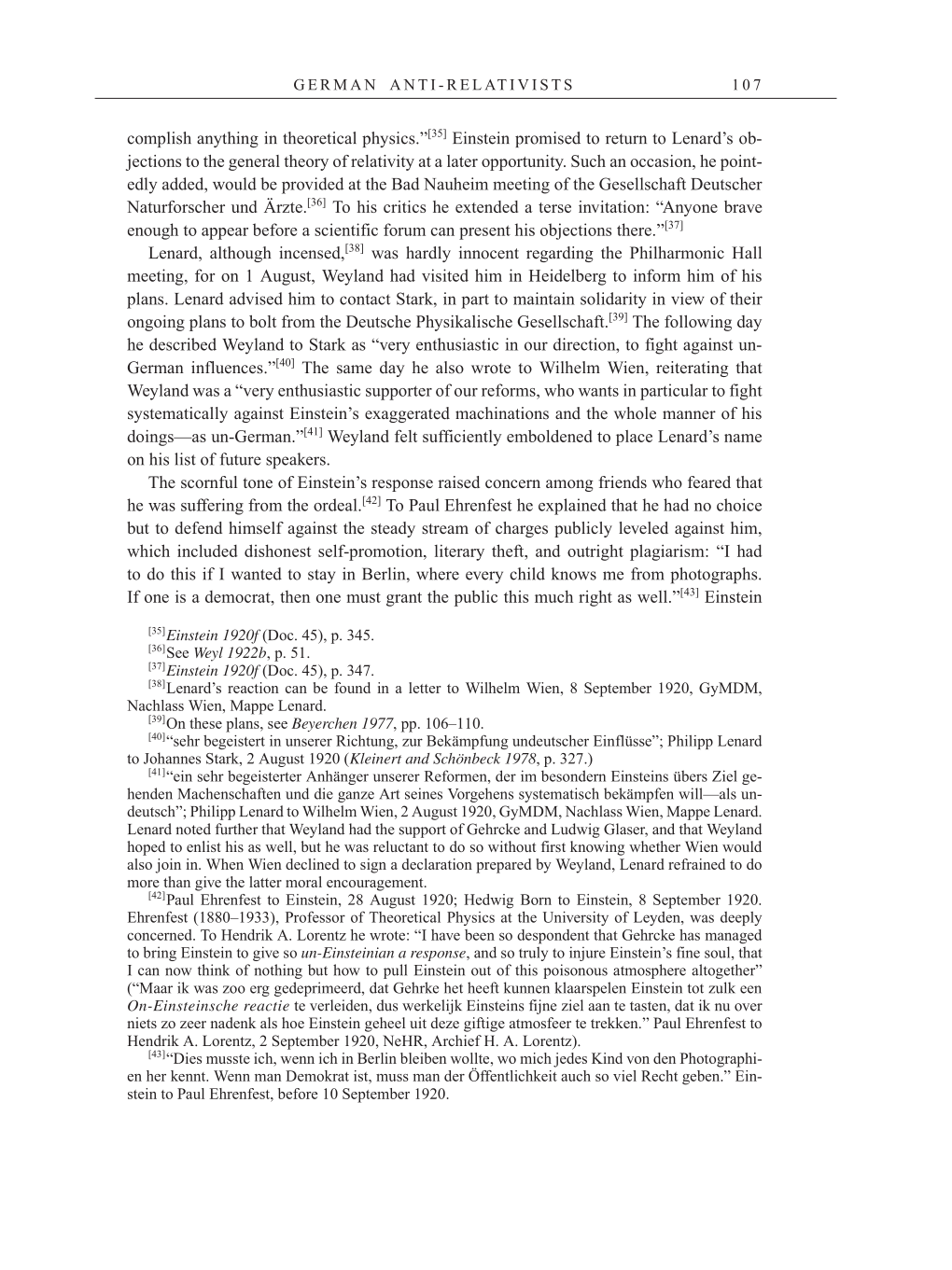G E R M A N A N T I - R E L AT I V I S T S 1 0 7
complish anything in theoretical
physics.”[35]
Einstein promised to return to Lenard’s ob-
jections to the general theory of relativity at a later opportunity. Such an occasion, he point-
edly added, would be provided at the Bad Nauheim meeting of the Gesellschaft Deutscher
Naturforscher und
Ärzte.[36]
To his critics he extended a terse invitation: “Anyone brave
enough to appear before a scientific forum can present his objections
there.”[37]
Lenard, although
incensed,[38]
was hardly innocent regarding the Philharmonic Hall
meeting, for on 1 August, Weyland had visited him in Heidelberg to inform him of his
plans. Lenard advised him to contact Stark, in part to maintain solidarity in view of their
ongoing plans to bolt from the Deutsche Physikalische
Gesellschaft.[39]
The following day
he described Weyland to Stark as “very enthusiastic in our direction, to fight against un-
German
influences.”[40]
The same day he also wrote to Wilhelm Wien, reiterating that
Weyland was a “very enthusiastic supporter of our reforms, who wants in particular to fight
systematically against Einstein’s exaggerated machinations and the whole manner of his
doings—as
un-German.”[41]
Weyland felt sufficiently emboldened to place Lenard’s name
on his list of future speakers.
The scornful tone of Einstein’s response raised concern among friends who feared that
he was suffering from the
ordeal.[42]
To Paul Ehrenfest he explained that he had no choice
but to defend himself against the steady stream of charges publicly leveled against him,
which included dishonest self-promotion, literary theft, and outright plagiarism: “I had
to do this if I wanted to stay in Berlin, where every child knows me from photographs.
If one is a democrat, then one must grant the public this much right as
well.”[43]
Einstein
[35]Einstein 1920f (Doc. 45), p. 345.
[36]See Weyl 1922b, p. 51.
[37]Einstein 1920f (Doc. 45), p. 347.
[38]Lenard’s reaction can be found in a letter to Wilhelm Wien, 8 September 1920, GyMDM,
Nachlass Wien, Mappe Lenard.
[39]On these plans, see Beyerchen 1977, pp. 106–110.
[40]“sehr begeistert in unserer Richtung, zur Bekämpfung undeutscher Einflüsse”; Philipp Lenard
to Johannes Stark, 2 August 1920 (Kleinert and Schönbeck 1978, p. 327.)
[41]“ein sehr begeisterter Anhänger unserer Reformen, der im besondern Einsteins übers Ziel ge-
henden Machenschaften und die ganze Art seines Vorgehens systematisch bekämpfen will—als un-
deutsch”; Philipp Lenard to Wilhelm Wien, 2 August 1920, GyMDM, Nachlass Wien, Mappe Lenard.
Lenard noted further that Weyland had the support of Gehrcke and Ludwig Glaser, and that Weyland
hoped to enlist his as well, but he was reluctant to do so without first knowing whether Wien would
also join in. When Wien declined to sign a declaration prepared by Weyland, Lenard refrained to do
more than give the latter moral encouragement.
[42]Paul Ehrenfest to Einstein, 28 August 1920; Hedwig Born to Einstein, 8 September 1920.
Ehrenfest (1880–1933), Professor of Theoretical Physics at the University of Leyden, was deeply
concerned. To Hendrik A. Lorentz he wrote: “I have been so despondent that Gehrcke has managed
to bring Einstein to give so un-Einsteinian a response, and so truly to injure Einstein’s fine soul, that
I can now think of nothing but how to pull Einstein out of this poisonous atmosphere altogether”
(“Maar ik was zoo erg gedeprimeerd, dat Gehrke het heeft kunnen klaarspelen Einstein tot zulk een
On-Einsteinsche reactie te verleiden, dus werkelijk Einsteins fijne ziel aan te tasten, dat ik nu over
niets zo zeer nadenk als hoe Einstein geheel uit deze giftige atmosfeer te trekken.” Paul Ehrenfest to
Hendrik A. Lorentz, 2 September 1920, NeHR, Archief H. A. Lorentz).
[43]“Dies musste ich, wenn ich in Berlin bleiben wollte, wo mich jedes Kind von den Photographi-
en her kennt. Wenn man Demokrat ist, muss man der Öffentlichkeit auch so viel Recht geben.” Ein-
stein to Paul Ehrenfest, before 10 September 1920.
